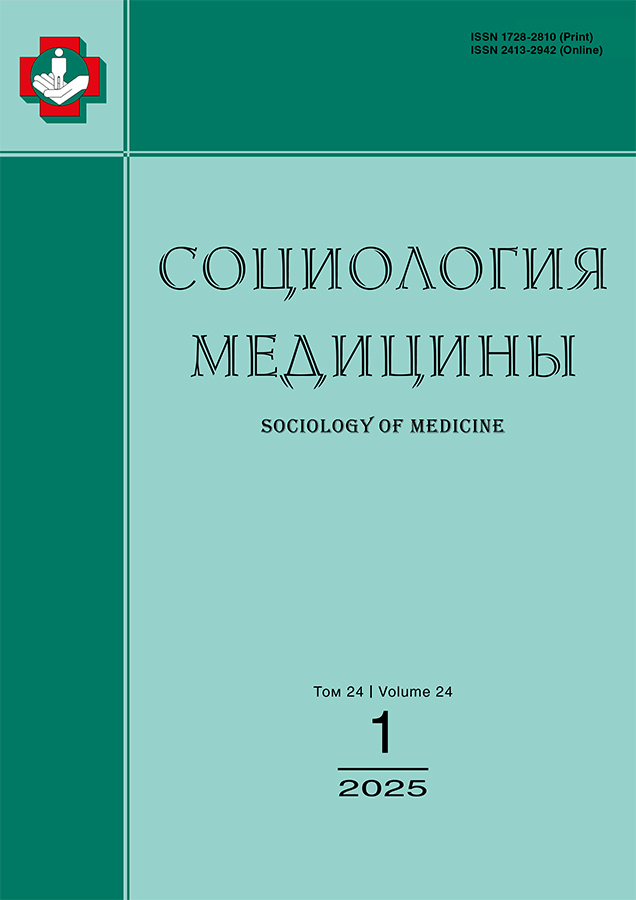Social adaptation in the system of secondary vocational education
- 作者: Gareeva I.A.1, Litvintseva S.A.2
-
隶属关系:
- Pacific State University
- Far Eastern State Medical University
- 期: 卷 24, 编号 1 (2025)
- 页面: 39-47
- 栏目: SOCIOLOGY OF MEDICAL PROFESSION
- URL: https://rjsocmed.com/1728-2810/article/view/641573
- DOI: https://doi.org/10.17816/socm641573
- EDN: https://elibrary.ru/LQIHCC
- ID: 641573
如何引用文章
详细
BACKGROUND: Medical professions have always been in demand and are socially important. Future specialists should develop not only professional competencies and practical skills but also social and professional values. This process faces certain difficulties and influencing factors. As an agent of professional socialization, the secondary medical education system should create conditions that foster the development of both personal and professional qualities in medical specialists, ensuring their consistent advancement in the process of socialization.
AIM: The study aimed to identify the factors influencing the success or failure of professional socialization within the secondary vocational education system.
MATERIALS AND METHODS: The survey was conducted among students at Khabarovsk Medical College and its branches. These institutions include 2320 students across six educational programs. A total of 378 respondents were interviewed using Google Forms questionnaires. Data analysis and generalization methods were used to address the objectives. Descriptive statistics provided by the Statistical Package for the Social Sciences and Microsoft Excel were employed to process the data and analyze the study materials.
RESULTS: The data analysis included the identification of external and internal social factors that contributed to professional socialization of specialists during their secondary medical education. Internal (subjective) factors include motivation to recognize the significance of work, the extent of expression of motivational attitudes (e.g., a desire to assist or treat people), vocational aptitude for the profession, and satisfaction with professional education results and conditions. The external (objective) factors include social, economic, and organizational influences.
CONCLUSION: Contemporary professional socialization is influenced by novel trends in the advancement of secondary medical education, which is associated with the qualitatively different approaches to acquiring general professional, vocational, and cultural competencies. The influence of external and internal factors on professional socialization within secondary vocational education was revealed, with the aim of identifying the factors that contribute to its success or failure. The most important internal factors for the respondents are desire to help people, vocational aptitude for the medical profession, interest in medical specialties, and awareness of the profession’s social importance. The external factors influencing the educational process include high mental workload and organizational aspects of the education.
全文:
作者简介
Irina Gareeva
Pacific State University
编辑信件的主要联系方式.
Email: gar_ia@mail.ru
ORCID iD: 0000-0002-3764-7073
Dr. Sci. (Sociology)
俄罗斯联邦, KhabarovskSvetlana Litvintseva
Far Eastern State Medical University
Email: svetlana-litvinceva@mail.ru
ORCID iD: 0009-0004-3576-1165
SPIN 代码: 3898-9266
Cand. Sci. (Sociology)
俄罗斯联邦, Khabarovsk参考
- Kuzmin AV, Trifonov YuN. Implementation mechanisms and perspectives state policy for the development of secondary vocational education in the Russian Federation. Scientific notes of the Tambov branch of RoSMU. 2022;(25):102–110. EDN: FTEVDQ
- Osipova LB, Enveri LA. Professional socialization of students in secondary professional education system. Bulletin of the Surgut State Pedagogical University. 2021;71(2):126–133. doi: 10.26105/SSPU.2021.71.2.011 EDN: ODYHNS
- Osipova LB. Features of professional socialization of students in the system of secondary vocational education. PNRPU Sociology and Economics Bulletin. 2023;(1):33–45. doi: 10.15593/2224-9354/2023.1.3 EDN: DKGARH
- Prisyazhnaya NV, Vyatkina NYu. Trajectories of a doctor's professional development: a narrative interview. Part 1. Sociology of medicine. 2023;22(2):183–201. doi: 10.17816/socm632475 EDN: EJOCVP
- Prisyazhnaya NV, Vyatkina NYu. Trajectories of a doctor’s professional development: a narrative interview. Part 2. Sociology of medicine. 2024;23(1):33–60. doi: 10.17816/socm634498 EDN: PYTOAL
- Donika AD. Modern trends of research of professiogenesis problem on the model of medical specialties. Human ecology. 2017;(2):52–57. doi: 10.33396/1728-0869-2017-2-52-57 EDN: VMQEIB
- Vaisburg AV. The process model of professional socialization specialist. Professional orientation. 2014;(1):32–43. EDN: TOBWHL
- Gorozia VE. The alienated world and the problem of human socialization (philosophical, sociolopsychological analysis). Saint Petersburg: Petropolis; 2001. P. 68–86. (In Russ.)
- Slastenin VA, Isaev IF, Shiyanov EN. Pedagogy: a teaching aid for students of higher pedagogical educational institutions. Slastenin VA, editor. Moscow: Publishing center «Academy»; 2002. 576 p. (In Russ.)
- Morozova AV. Professional socialization of college students in the context of modernization of educational institutions [dissertation]. Tula; 2004. 240 p. EDN: NMYIJD
- Gabdrakhmanov NK, Orlova VV, Alexandrova YuK. Migration behavior of Russian university students based on digital footprint data. Tomsk State University Journal. 2021;(467):106–114. doi: 10.17223/15617793/467/14 EDN: IJYMZD
- Zelenina EA. Social attitudes of graduates of a modern university in relation to the future professional trajectory. In: Materials of the International scientific and practical conference «The role of socio-economic, social and humanitarian sciences in the modernization of the state and society». Belgorod; 2023. P. 26–29. EDN: XSIMMT
- Zhdanov IA. Factors of professorial socialization of students. In: Materials of the International scientific and practical conference «The role of socio-economic, social and humanitarian sciences in the modernization of the state and society». Belgorod; 2023. P. 23–26.
- Kolobaev SA, Katanskij SA. Overcoming the phenomenon of “closed doors” in career building within the framework of natural selection. Sociodynamics. 2021;(7):13–22. doi: 10.25136/2409-7144.2021.7.34610 EDN: KXBPFC
补充文件






